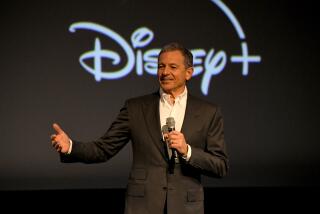Disney Accused of Talking Down Its Future to Cut Katzenberg Share
- Share via
The lawyers for Jeffrey Katzenberg on Tuesday accused Walt Disney Co. of deliberately talking down its own prospects in a “business down the drain” strategy to keep from paying the former studio executive what he was due as a send-off bonus when he left in 1994.
The arguments began the latest phase of Katzenberg’s bitter breach-of-contract lawsuit against his former employer, with Disney contending he was due about $140 million and Katzenberg jousting for as much as $580 million.
Katzenberg lawyer Bert Fields challenged company arguments made in court papers that some of the new technologies that could generate future movie profits are dreamy prospects that may never happen.
Demonstrating a talking “Arthur” doll that interacts with a computer, and showing an advanced television system purchased over the weekend at an electronics chain, Fields argued that many of the technologies are already here. They include video on demand, a system in which consumers will be able to call up a huge library of films from home to watch instead of venturing to a video store.
Disney argues that Katzenberg’s assessment of the future value of the films and TV shows created during the 10 years he headed the company’s studios is wildly unrealistic based on history, technological possibilities and the prospect of some markets such as China, where the company argues that rampant piracy and relatively low income levels will temper growth prospects.
Referring to Katzenberg’s assessment as “imagined future profits,” Disney argues that Katzenberg’s final bonus should have been around $140 million.
But Fields argued that Katzenberg should be paid as much as $578 million based on Disney’s $500-million buyout in 1995 of partners who invested in its films through Disney’s Silver Screen partnership program.
Fields also alleged that Disney had destroyed some relevant documents related to those partnerships. The studio is expected to argue that Fields’ accusation is sensationalistic, and that it supplied scores of documents and only destroyed early drafts, a normal business practice.
Katzenberg’s employment contract called for him to get a final, lump-sum bonus in 1996, two years after he left Disney, based on 2% of the projected future profits of the films and TV shows launched during his tenure, including “The Lion King,” “Aladdin” and “Beauty and the Beast.”
Katzenberg, now a partner in rival studio DreamWorks SKG, reached a partial settlement with Disney in 1997 in which he received $117 million, $77.5 million of which will offset the eventual amount a court referee decides he is owed. The eventual number retired Superior Court Judge Paul Breckenridge Jr. decides on also will be reduced by taking only 72.5% of it under a discount both sides agreed to in the partial settlement.
Fields argued that Disney’s dismissal of China’s growth prospects for entertainment contrast with the company’s own bullish statements about China’s growth prospects and with economic and income information.
“Don’t think of a guy wearing a big hat standing in a rice paddy,” Fields said, noting that China’s coastal cities are rich, modern cities featuring a growing middle class with increasing disposable income to spend on entertainment.
During the current phase of the trial Fields also is expected to raise a number of other issues, including whether Disney has sold films to its own ABC unit at below-market prices, which would deprive Katzenberg of more profits.
More to Read
The biggest entertainment stories
Get our big stories about Hollywood, film, television, music, arts, culture and more right in your inbox as soon as they publish.
You may occasionally receive promotional content from the Los Angeles Times.










